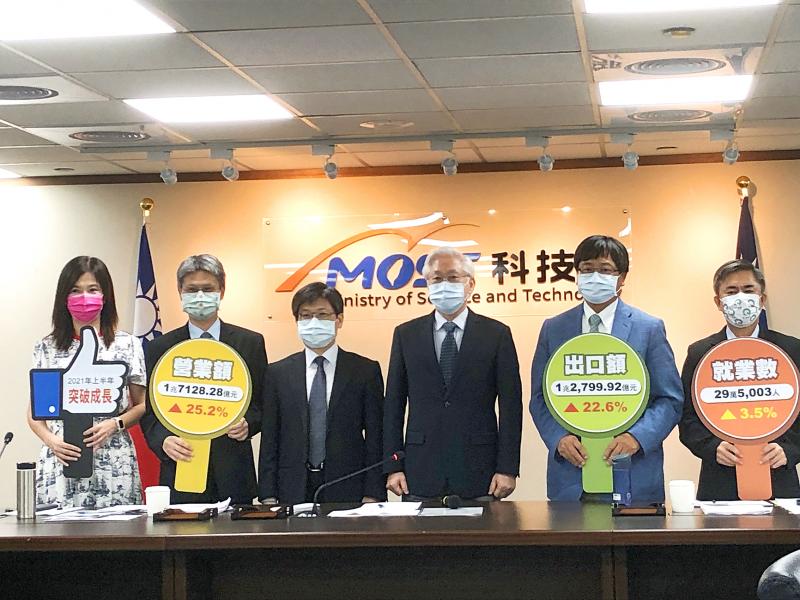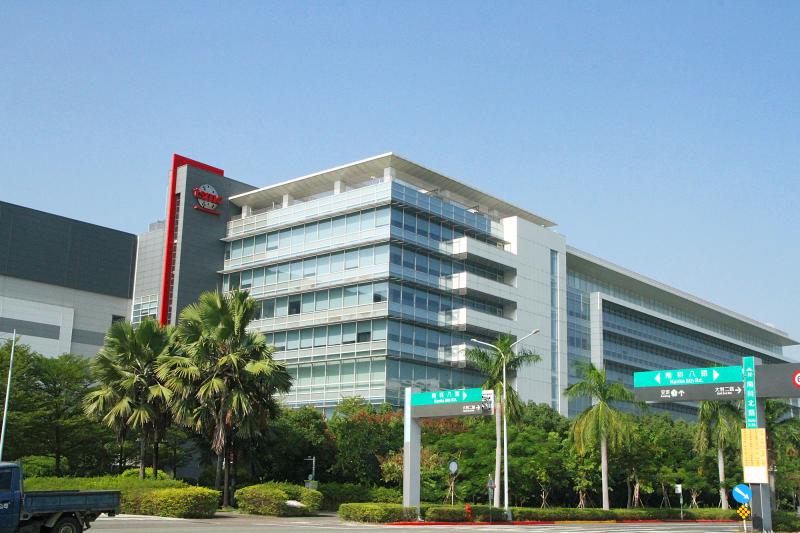Taiwan’s three science parks posted a record combined revenue of NT$1.71 trillion (US$61.69 billion) for the first half of this year, up 25.2 percent year-on-year and the fastest increase in almost eight years, the Ministry of Science and Technology told a news conference in Taipei yesterday.
The three parks — Hsinchu Science Park (新竹科學園區), the Central Taiwan Science Park (中部科學園區) and the Southern Taiwan Science Park (南部科學園區) — generated combined exports of about NT$1.28 trillion in the first six months of the year, also a new high, the ministry said.
The ministry attributed the the three science parks’ performance to continued global demand for 5G, high-performance computing and other new tech applications.

Photo: CNA
The three parks provided jobs for 295,000 people, up 3.5 percent year-on-year and also a new high, it said.
Imports to the parks totaled NT$493.08 billion, up 22.5 percent year-on-year, on increased prices of raw materials and electronic components, the ministry said.
Hsinchu Science Park posted revenue of NT$743.97 billion in the first half of the year, up 31.42 percent annually, thanks to growth in demand for electronics, and information and communications technology, as well as other high-tech products, the ministry said.

Photo: CNA
Central Taiwan Science Park reported revenue of NT$482.79 billion over the same period, up 11.48 percent year-on-year, mostly on continued demand for 5G, artificial intelligence, automotive electronics and high-performance computing applications.
Southern Taiwan Science Park, home to the most advanced 5-nanometer chip making process, saw revenue jump to NT$480.06 billion, up 31.74 percent year-on-year, the ministry said.
Minister of Science and Technology Wu Tsung-tsong (吳政忠) said that due to the stay-at-home economy and an increase in distance learning and working, the optical product sector shook off the doldrums experienced in the past few years years and revenue jumped 35.44 percent.
The integrated circuit sector placed second with regards to growth. It saw revenue grow 24.29 percent, while the computer and peripherals sector followed with an increase of 20.77 percent.
Taiwan Semiconductor Manufacturing Co (TSMC, 台積電), the world’s largest contract chipmaker, has a presence at all three science parks, accounting for 17 percent of overall revenue in Hsinchu Science Park, 42.27 percent in the Central Taiwan Science Park and 55 percent in the Southern Taiwan Science Park, ministry data showed.
TSMC made up 34 percent of the three science parks’ combined revenue, a slight decline from last year’s 41 percent, the data showed.
The ministry said it anticipates a continued increase in demand in the second half of the year as the global economic environment improves.
It predicted whole-year growth of 15 percent for the three science parks’ combined revenue this year.
Separately, TSMC’s rumored expansion in Kaohsiung is likely to help the chipmaker hedge against water shortage risks, Taiwan Institute of Economic Research (台灣經濟研究院) researcher Arisa Liu (劉佩真) told Central News Agency (CNA) yesterday.
Local media reported last week that TSMC is considering building a new 7-nanometer hub in Kaohsiung’s Linyuan District (林園).
Liu said that TSMC is “most likely” to invest in a new facility in Kaohsiung, as the three major science parks have become increasingly saturated with businesses.
“I anticipate with a TSMC foundry acting as a magnet, Kaohsiung can create a new semiconductor industrial cluster and that would be beneficial to balancing the development between the different regions in Taiwan,” Liu told CNA.

TAKING STOCK: A Taiwanese cookware firm in Vietnam urged customers to assess inventory or place orders early so shipments can reach the US while tariffs are paused Taiwanese businesses in Vietnam are exploring alternatives after the White House imposed a 46 percent import duty on Vietnamese goods, following US President Donald Trump’s announcement of “reciprocal” tariffs on the US’ trading partners. Lo Shih-liang (羅世良), chairman of Brico Industry Co (裕茂工業), a Taiwanese company that manufactures cast iron cookware and stove components in Vietnam, said that more than 40 percent of his business was tied to the US market, describing the constant US policy shifts as an emotional roller coaster. “I work during the day and stay up all night watching the news. I’ve been following US news until 3am

UNCERTAINTY: Innolux activated a stringent supply chain management mechanism, as it did during the COVID-19 pandemic, to ensure optimal inventory levels for customers Flat-panel display makers AUO Corp (友達) and Innolux Corp (群創) yesterday said that about 12 to 20 percent of their display business is at risk of potential US tariffs and that they would relocate production or shipment destinations to mitigate the levies’ effects. US tariffs would have a direct impact of US$200 million on AUO’s revenue, company chairman Paul Peng (彭雙浪) told reporters on the sidelines of the Touch Taiwan trade show in Taipei yesterday. That would make up about 12 percent of the company’s overall revenue. To cope with the tariff uncertainty, AUO plans to allocate its production to manufacturing facilities in

Six years ago, LVMH’s billionaire CEO Bernard Arnault and US President Donald Trump cut the blue ribbon on a factory in rural Texas that would make designer handbags for Louis Vuitton, one of the world’s best-known luxury brands. However, since the high-profile opening, the factory has faced a host of problems limiting production, 11 former Louis Vuitton employees said. The site has consistently ranked among the worst-performing for Louis Vuitton globally, “significantly” underperforming other facilities, said three former Louis Vuitton workers and a senior industry source, who cited internal rankings shared with staff. The plant’s problems — which have not

COLLABORATION: Given Taiwan’s key position in global supply chains, the US firm is discussing strategies with local partners and clients to deal with global uncertainties Advanced Micro Devices Inc (AMD) yesterday said it is meeting with local ecosystem partners, including Taiwan Semiconductor Manufacturing Co (TSMC, 台積電), to discuss strategies, including long-term manufacturing, to navigate uncertainties such as US tariffs, as Taiwan occupies an important position in global supply chains. AMD chief executive officer Lisa Su (蘇姿丰) told reporters that Taiwan is an important part of the chip designer’s ecosystem and she is discussing with partners and customers in Taiwan to forge strong collaborations on different areas during this critical period. AMD has just become the first artificial-intelligence (AI) server chip customer of TSMC to utilize its advanced